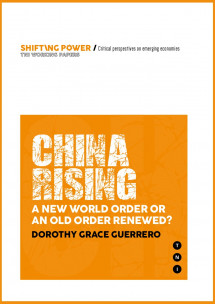China Rising A New World Order or an Old Order Renewed
Temas
Understanding China's rise on the global stage cannot be understood without acknowledging its role in reinforcing neoliberal globalisation. Allying with nascent Chinese civil society will be critical for reshaping China and the world's future.

Descargas
Autores
Transnational Institute’s (TNI) Shifting Power Working Paper Series seeks to help movements navigate our changing multipolar world as well as provide an invaluable source of alternative analysis for students, analysts and journalists.
China Rising: A New World Order or an Old Order Renewed?
China’s remarkable economic performance over more than thirty five years and its transformation into one of the world’s biggest trading powers, has led many to believe that it will be the successor to the US in global dominance. The stagnation of the advanced capitalist economies and contraction of the economies in the Eurozone in recent years have strengthened the notion that the world is at a turning point in the balance of power between the advanced economies of the North and the emerging economies of the South such as China, India, Brazil and South Africa.
The new configuration of power has increased the representation of developing countries in key and decisive processes in the United Nations, the World Trade Organisation and International Financial Institutions like the World Bank and International Monetary Bank, as well as in informal but strategic summits like the G20 group. Little attention has been given, however, to the central issue for many people in the South, which is not just China’s rise or growth nor even the relative state of democracy there.
The more important question is whether China and the other new actors are offering a new and better model of development that could chart economic and social progress for other developing countries? Already a growing number of voices are pointing to China becoming a “sub-imperialist” or a “new imperialist” power that is continuing the same or more intense practices of exploitation and extraction of resources from poorer countries to enable it to join the ranks of the world’s high income countries.
Given China’s extraordinary success as a new economic power in the global economy, is China resuscitating a flagging and failing capitalist system? Is it giving new energy to the same unsustainable and unjust paradigm that facilitates the accumulation of wealth by a few while resulting in dispossession and pauperisation of the already marginalised and disempowered?
It is certainly the time to turn the spotlight on the implications for civil society of a global order in which China is an ever more dominant player. Various forecasts predict that China will soon surpass the US as the top global economic power. Whether this will happen as early as 2016 as the IMF predicted using purchasing power parity as basis of analysis4 or by 20205 or by 20306 according to the World Bank, most “guesstimates” agree that it will be earlier than previous assessments.
China’s rise to the top does not of course mean that China will soon rule the world the way the US does. It is beset by huge challenges and contradictions: limited agricultural land and water resources to meet the needs (and demands) of its massive population and fuel its continuing growth; increasingly polluted air and water; widening income disparities, especially between urban and rural populations; the inevitable collapse of unsustainable price controls on fuel and food; and massive corruption are just some of the problems that could raise people’s discontent and upset the Communist Party’s control. There is also a growing civil society that must be involved in global movements for justice. The fact that it
makes up a seventh of the world’s population, and that its social and environmental policies will impact on everyone globally, means that understanding China is more important than ever before.